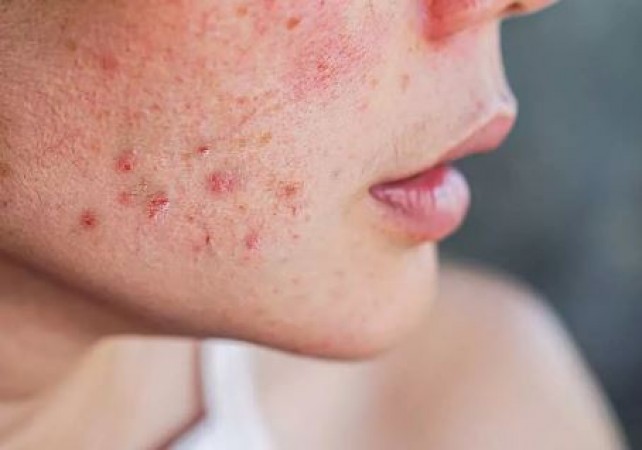
During their menstrual cycles, many girls often find themselves battling pimples on their faces. These breakouts are frequently attributed to hormonal changes that occur during this time, impacting their skin's appearance and causing concerns about beauty. If you're experiencing this issue, there are several practical tips you can follow to manage acne effectively during your periods.
Acne during menstruation is a common occurrence due to hormonal fluctuations that affect the skin's oil glands. These changes can lead to increased sebum production, clogged pores, and ultimately, pimples. Understanding how to address these issues can help maintain clearer skin and boost confidence during what can already be a challenging time.
Hormonal acne, specifically during periods, is primarily driven by changes in estrogen and progesterone levels. These fluctuations can stimulate the skin's oil glands to produce more sebum, creating an environment conducive to acne development. Typically, pimples associated with menstrual cycles tend to appear a few days before menstruation begins and may continue through the menstrual period itself.
Maintain a Consistent Cleansing Routine
One of the most crucial steps in managing acne during periods is maintaining a regular cleansing routine. Wash your face gently but thoroughly at least twice a day using a mild cleanser suitable for your skin type. This helps remove excess oil, dirt, and bacteria that can contribute to acne breakouts.
Use an Oil-Free Moisturizer
Despite dealing with acne, it's essential to moisturize your skin. Choose a lightweight, oil-free moisturizer that won't clog pores or exacerbate acne. Moisturizing helps maintain skin barrier function and prevents excessive dryness, which can ironically lead to increased oil production.
Spot Treat Pimples with Tea Tree Oil
Tea tree oil is known for its antimicrobial properties, making it effective in combating acne-causing bacteria. Dilute tea tree oil with a carrier oil like jojoba or coconut oil and apply it directly to pimples using a cotton swab. This can help reduce inflammation and promote healing.
Avoid Touching Your Face
During periods of hormonal acne, it's crucial to avoid touching your face unnecessarily. Touching can transfer bacteria from your hands to your face, exacerbating existing acne or causing new breakouts. Be mindful of this habit and try to keep your hands away from your face as much as possible.
Use Ice to Reduce Inflammation
Ice can be a quick and effective way to reduce inflammation and swelling associated with pimples. Wrap an ice cube in a clean cloth and apply it gently to affected areas for a few minutes. This helps constrict blood vessels and soothe irritated skin.
Consider Over-the-Counter Acne Treatments
Over-the-counter acne treatments containing ingredients like benzoyl peroxide or salicylic acid can be beneficial during periods of increased acne. These ingredients help unclog pores, reduce inflammation, and kill acne-causing bacteria. Follow the product instructions carefully to avoid over-drying or irritating your skin.
Maintain a Healthy Diet
Eating a balanced diet rich in fruits, vegetables, lean proteins, and whole grains can support overall skin health. Avoid excessive consumption of sugary or processed foods, as these can contribute to acne flare-ups. Stay hydrated by drinking plenty of water throughout the day to help flush out toxins and keep your skin hydrated.
Manage Stress Levels
Stress can exacerbate hormonal imbalances and trigger acne outbreaks. Practice stress-reducing techniques such as deep breathing, meditation, yoga, or regular exercise to help manage stress levels. Adequate sleep is also essential for hormonal balance and overall skin health.
Avoid Heavy Makeup
During periods of acne flare-ups, it's advisable to minimize the use of heavy makeup products. Makeup can clog pores and potentially worsen acne. If you must wear makeup, choose non-comedogenic products that are specifically formulated not to clog pores and remove makeup thoroughly before bedtime.
Consult a Dermatologist if Needed
If your acne during periods is severe or persists despite home remedies and over-the-counter treatments, consider consulting a dermatologist. A dermatologist can assess your skin condition, prescribe medications if necessary, and recommend personalized skincare routines to manage acne effectively.
Managing acne during periods requires a combination of consistent skincare habits, healthy lifestyle choices, and sometimes, professional guidance. By understanding the underlying causes of hormonal acne and implementing targeted strategies, you can effectively minimize breakouts and maintain clearer, healthier skin. Remember to be patient with your skincare routine and give treatments time to work, as consistent efforts can yield significant improvements over time.
Here's Why Airtel Increases Tariffs by Up to 21% Across Voice and Data Plans
North Korea Claims Successful Test of New Multiwarhead Missile; South Korea Labels it a Failure
Google Chrome Boosts Search Experience with New Features and Design Updates